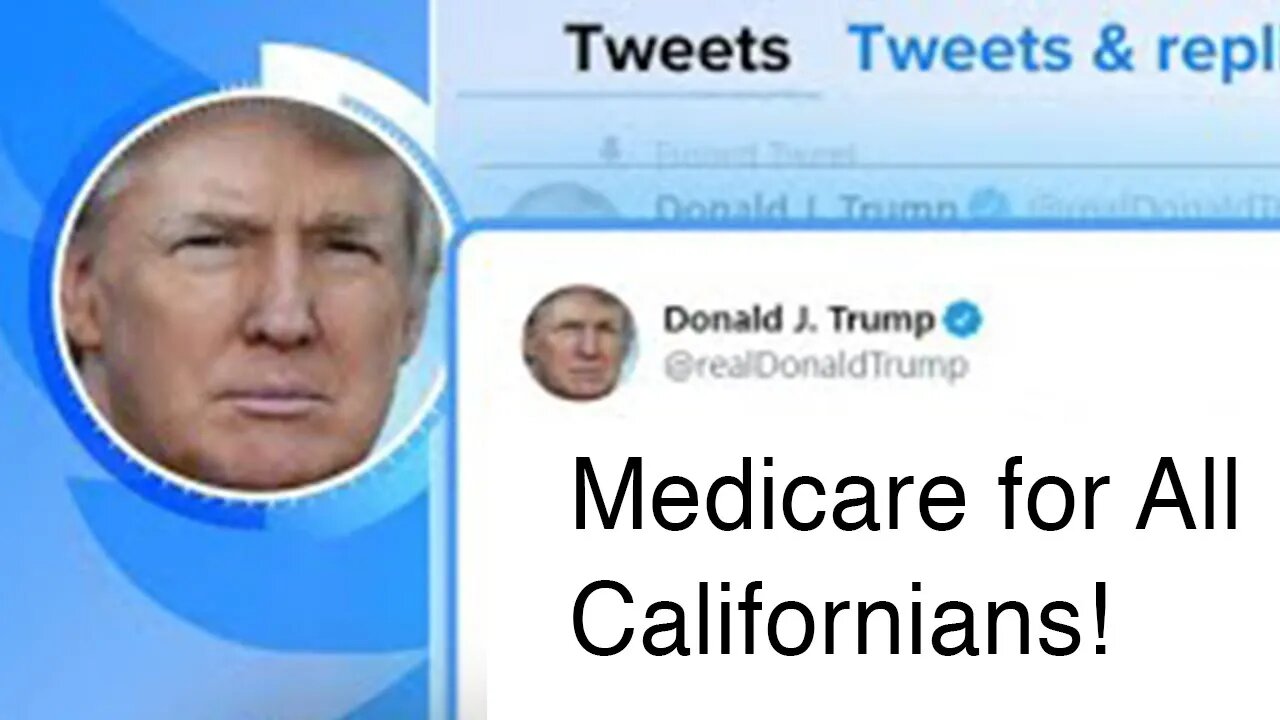Premium Only Content

Donald Trump: Medicare-for-All-Californians | Why Single-Payer Should Be Done At the State-Level
A smart campaign tactic would be if Trump went to California to proclaim, “Medicare for All Californians!” The media would probably follow-up, “But why don't you support Medicare for All Americans?”
He could explain that Texans don’t want it so why should he force it on them? Democracy! He could also explain that according to the U.S. Constitution this sort of thing is supposed to be done at the state level. Tenth Amendment! Republicans believe in states-rights and so if 70% Califorianians want it, as polls indicate, then let them have it! This could be just one more way Donald Trump benefits from the populist wave Bernie Sanders helped build.
Depending on the poll question and sample size, Medicare-for-All has about 30% — 60% support across America, but over the years support has become more polarized
where Republicans support it less and less and Democrats support it more and more. The silver lining for single-payer advocates is it’ll be easier to pass single-payer in Democrat-majority states like New York, Vermont, and California.
In a previous answer, I discussed why it hasn’t happened yet, but in this article, I will discuss why it should be done at the state-level first.
Fundamentally it comes down to, “Ideas are worthless. Execution is everything.” — Scott Adams
In 2010, the Affordable Care Act’s poor execution helped Republicans take back control of the House of Representatives. In 2016, Republicans came within one vote from repealing it.
With the elimination of private insurance and bigger tax increases, single-payer would be a much bigger change and so even in a best-case scenario: Republicans don’t push back too hard in the various branches/levels of government, corporate media largely gets on board, and there isn’t “a death by a thousand lawsuits,” there still will be a lot of disagreement over the details, which will openly be aired out in the Twittersphere for Republicans to then galvanize support to take back control of the government. It’s also almost as inevitable as a rising tide that the minority party will take back control of at least one branch of government in at least 4 years. The longest period of unified American government (House, Senate, Presidency) in modern American history was 1993–1997. After single-payer is implemented and Republicans take back control then they will bring a sledgehammer or a scalpel to sabotage any success single-payer might have achieved if given enough time. Once single-payer is dismantled it will be much harder to expand or reimplement.
As a comparison, Medicare was passed in 1960 with bipartisan support, which meant neither party could crusade against it and it was expanded over time so that people who were directly affected by it, i.e. seniors and the disabled, overwhelmingly supported its evolution.
The bottom line here is if Medicare-for-All is implemented then there are so many moving parts and entrenched opposing forces (political party, businesses, organizations, insurance companies) that it will be a steep uphill battle with the very real possibility that single-payer could be such a heavy change that it could slide backward and crash and burn to the point where no American politician would want to touch it again for decades.
How can Medicare-for-All supporters reduce some of the hill’s steepness and the bill’s weightiness? By supporting a state-based single-payer.
Most Republicans won’t support Medicare-for-All in their state, although some will as evidenced by the fact some Republicans supported Obamacare at the state-level, i.e. Romneycare. Most Republicans however will support (or at least not oppose) Californianians, New Yorkers, Vermonters right to govern themselves and so if single-payer is what they want then let them “eat cake.”
In terms of ensuring maximum effectiveness, it also makes sense to implement single-payer in at least one U.S. state where there is broad support than to impose it on the entire U.S. where at least 25 states would strongly oppose it.
After all, this is a similar path our progressive neighbors to the north followed, which if it was good enough for their smaller population and economy to follow then it seems even more sensible for our larger population and economy to do the same. In 1947, Canada’s single-payer healthcare system started as an experiment in one province, Saskatchewan. Alberta followed suit. By the 1960s, single-payer was adopted by all the Canadian provinces and since then legislation like the Medical Care Act and the Canada Healthcare Act has centralized more and more of the funding and power...
-
 6:33
6:33
Anthony Galli
1 year agoHow Socialism Runs American “Capitalism”
38 -
 LIVE
LIVE
Flyover Conservatives
20 hours agoWARNING! October 7th Unpacked and Exposed: What REALLY Happened?; GEN Z BACKS HAMAS?! - Hannah Faulkner | FOC Show
528 watching -
 LIVE
LIVE
Barry Cunningham
2 hours agoPRESIDENT TRUMP IS BRINGING THE RECKONING TO THE DEEP STATE!
6,039 watching -
 LIVE
LIVE
Sarah Westall
2 hours agoSuperhuman Hearing of the Matrix: Reality is Different w/ Sharry Edwards
258 watching -
 LIVE
LIVE
LFA TV
23 hours agoLIVE & BREAKING NEWS! | TUESDAY 10/7/25
576 watching -
 30:00
30:00
BEK TV
6 days agoGUT HEALTH AND THE POWER OF KIMCHI WITH KIM BRIGHT ON TRENT ON THE LOOS
106K9 -
 33:18
33:18
Stephen Gardner
1 hour ago🔥BOMBSHELL: Trump's NEW REPORT Catches Democrats Red-Handed!
7.24K4 -
 10:20
10:20
Ken LaCorte: Elephants in Rooms
6 hours ago $0.16 earnedWhen does a fetus become a baby?
3.21K4 -
 1:40:39
1:40:39
Glenn Greenwald
5 hours agoPam Bondi's Malicious Ineptitude on Full Display During Senate Hearing; Pro-Spying Senators Complain About Being Surveilled; What New Candace/Charlie Kirk Messages Reveal | SYSTEM UPDATE #528
104K90 -
 LIVE
LIVE
SpartakusLIVE
3 hours agoPREPARE to have your Frontal Lobe SEARED with MIND BENDING Content
172 watching
